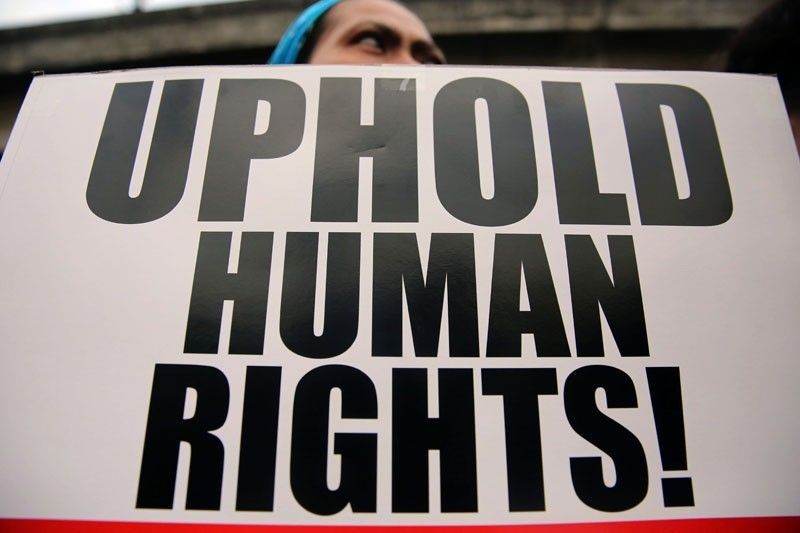Commentary: Fostering accountability for human rights abuses

In the past 123 years of service of the Philippine Army, long has been its toil against threats to national peace and security. The past few decades were profusely marred with a multitude of combat against insurgency and extremism influenced and brought about by international threats of terrorism.
As one of the three major services of the Armed Forces of the Philippines, the Philippine Army carries the constitutional and lawful mandate of being in the forefront of operations to sustain lasting peace conducive to sustainable progress and development. To this end, countless lives of Filipino soldiers were dedicated for the citizens and country.
In 2013, Zamboanga experienced a fierce confrontation between the Army and a group of insurgents from the Moro National Liberation Front (MNLF). Known as the Zamboanga siege, the combat lasted for three weeks, resulting in casualties, injuries and indiscriminate damage to infrastructure. The longest siege in the Philippine Army history transpired a mere three years ago and was instigated by militant groups allied with international extremist organizations.
The aftermath of the Marawi siege is riddled with fatalities and damage to the life and properties of the citizens of the city. This year, the people of Jolo were met with twin suicide bombings that cost the lives of at least eight security personnel and six civilians while wounding many more. Towards the second quarter of the year, however, the Army shifted its focus on a different kind of enemy—one that poses immense threat to health of the people and indiscriminately affects anyone.
To date, the Army’s role in safeguarding the nation and its citizens is constantly expanding to accommodate the needs of the changing security environment and to adapt to transpiring unconventional threats.
In performance of this duty and by the nature of operations, the Philippine Army’s history is stained by accusations and allegations of violating laws protecting a human’s life, dignity and basic rights.
A decade ago, the Army Transformation Roadmap (ATR) was first conceptualized with a specific set of change agenda that aims to change the public perception as well as to highlight the Army’s expanding role. This change agenda carries over to the systems and processes, unit capability, as well as to the individual perception of the Army.
Through the ATR, the PA aspired to transform not only the public perception but also its approach and operation by becoming an ethical, competent, and professional Army that is deserving of our countrymen’s pride.
Further, Executive Order 70 that espouses the whole-of-nation approach, is intended to harness a more socially inclusive and less combatant method of putting an end to insurgency. This approach aims to nip the social ails that is harnessed by insurgent groups to exploit communities.
With an inclusive and collaborative approach with local and national government agencies and institutions, the Army’s role has moved beyond its traditional military approach to a more socially sensitive and inclusive approach to end local insurgency.
By persistently fostering transformation through good governance, the Philippine Army is striving towards achieving and maintaining a brand of honor, patriotism and duty. The gains of these efforts are seen from the increasingly progressing public perception as reflected by the continuing uptrend in nationwide trust and satisfaction rating.
In an effort to sustain and build on these gains as well as to ensure that the Filipino soldier is sensitive and unassociated to issues and allegations relating to offences on human rights violations, the Philippine Army, under the leadership of Lieutenant General Cirilito Sobejana, advocated for the creation of a Legal and Diplomatic Relations Committee under its Multi-Sector Advisory Board (MSAB).
The MSAB is the Army’s advocates, partners, and accountability partners in ensuring that good governance under the Army Transformation Roadmap is deeply embedded and implemented in the organization’s processes and operations.
During the conduct of the fourth and last quarterly meeting of the Board, MSAB Chairperson and Philippine Economic Zone Authority Director General Charito Plaza recommended and approved the proposal of the Governance Committee of inviting more experts and professionals in the field of law as members of the new committee.
These individuals shall carry out the roles and function of providing legal advice and policy recommendation to the Army to ensure its compliance to the International Humanitarian Law, human rights and rule of law. The mandate of the committee aims to support the Army’s efforts in contributing to building a just and humane society.
The prospective members of the committee includes Assistant Solicitor General Peñafrancia Carpio-Devesa, Department of Foreign Affairs Undersecretary Eduardo Malaya, Commission on Human Rights Commissioner Leah Tanodra-Armamento and Philippine Consul General to San Francisco Henry Bensurto Jr.

The Board aims to further engage luminaries from the Commission on Human Rights, among others, to ensure the comprehensive composition of the committee.
With the creation of the Legal and Diplomatic Relations Committee, every Filipino soldier is ensured and expected to harness efforts to recognize the sanctity of life, place the rights and freedom of every human with supreme appreciation, and to alleviate the suffering of individuals even in the event of war and conflict.
As no one is above and beyond the rule of law, the Philippine Army must be in the fore of exemplifying accountability to the constitution and law. As the sworn protectors of the Filipino people and their land, the Philippine Army must share the responsibility of advocating for human rights to be the nation’s beacon of hope and builders of peace.
Louise Antonette Sandoval is from the Army Governance and Strategy Management Office.
- Latest
























